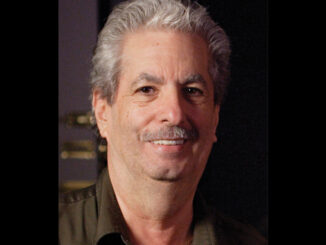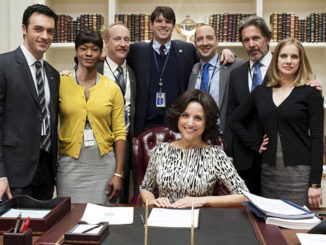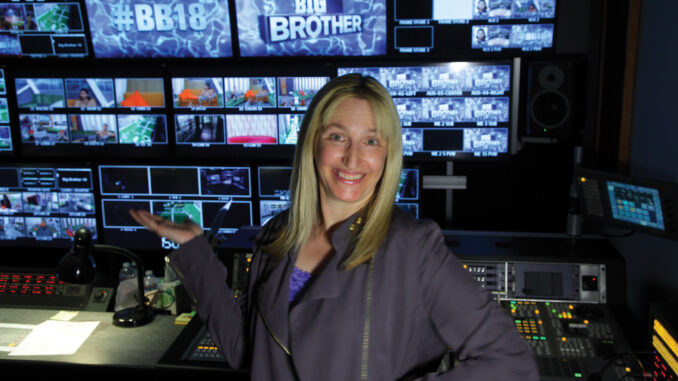
by Debra Kaufman
portraits by Gregory Schwartz
The CBS-TV hit Big Brother, hosted by Julie Chen and now in its 18th season, has a winning formula: Viewers watch a diverse group of people living together in a house, as dozens of high-definition cameras record their every move, 24 hours a day. Each week, in a live event, the houseguests vote someone out of the house, until the last remaining houseguest wins the grand prize of $500,000. The live event, with Chen in the studio, is a complicated mix of house cameras, live-show cameras, monitors with logos, graphics and a live camera feed. The elimination vote leads immediately into a Head of Household competition, in which all the cameras move outdoors and set up, shaded properly, during a commercial break.
“It’s an incredible feat,” says Christine Salomon, who has been the show’s full-time technical director since Season 9 (she started with three episodes in Season 8). “The show is very technically complicated in general. There’s so much going on; it’s almost an engineer’s nightmare.”
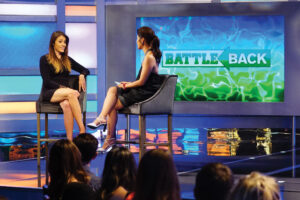
Salomon is only one of a handful of women technical directors (TDs) in the industry. During a summer break at SUNY Buffalo, she went to New York, hoping for an internship with NBC’s Later with Bob Costas. Instead, she was offered a position with Diamond Vision, which handles all the screen entertainment between innings, at Yankee Stadium. “It was a paid internship, so I applied for it,” she recalls. Her job was to come up with the facts that would be displayed on the screen. Then one day, when there was a rain delay, the crew went for a hot dog and the stadium’s TD told her she could sit at the switcher. “I got a taste of it for five minutes,” she says.
And she liked it. Back at SUNY Buffalo, Salomon managed to get the contact information for Bill Lamb, ESPN’s vice president of engineering. She sent a resume and asked for an informational interview. “He implied I could have a job — and I was ready to leave school and come work there,” she reveals. “But he told me I had to finish school first.”
A month before graduation, Lamb called Salomon to tell her she had the job. That’s where, she says, she learned to be a technical director over a span of six years. “ESPN trained me in all tech areas, including master control, commercial dubbing, studio camera and tape,” she acknowledges. “In my spare time, I would ask for tasks to do on the switcher, like making the American flag, so I could learn wipes, background colors and so on. I did that enough and showed that I had an interest and aptitude.”
She also learned the switcher by ghost-TDing the show. “I didn’t have all the sources, but would go through all the button presses by listening to the director of SportsCenter on headset in an empty control room,” she explains. “Eventually, that led them to putting me on real training for the 2:30 a.m. SportsCenter flagship show.”
On Big Brother, Salomon never has a dull moment.
“I have access to over 30 total cameras, mixed with the five live studio cameras,” she explains. “I blend the two, but also feed logos, graphics or live cameras to the four monitors on set.”
After working that time slot for a couple of years, Salomon got promoted to the 7:00 p.m. slot. Other things were changing. “Between 1990 and 1996, ESPN was growing and growing,” she says. “We were in a little bubble in Connecticut and didn’t even know about the union. But they started hiring stage managers and associate directors from Los Angeles, and I began to hear about the union. I knew I needed to make a life change.”
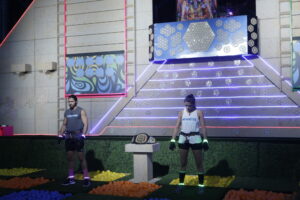
She moved to Los Angeles without a job in 1996. Within three days, she was working at Fox Sports News and joined NABET (the National Association of Broadcast Employees and Technicians union). “That was the beginning of my freelance career,” says Salomon, who notes that most TDs in Los Angeles work freelance. While working on The Tyra Banks Show, her head utility told her she needed to join IATSE. “And I asked, ‘Why? I’m working plenty,’” she recalls. “He told me I’d get more respect and credibility. No one had ever explained to me the benefits of being in the IA. I quickly found the quality of IA shows are so much better and generally more organized — and the producers care about their crews.”
Almost immediately after joining the Editors Guild, which began representing TDs in the early 1980s (they were previously part of the Cinematographers Guild), she began getting calls for more union gigs. One of those calls was for Big Brother. During the 2007-08 writers strike, CBS decided to do a winter season of the popular reality show and the TD who normally worked it wasn’t available. “I had filled in for him for three episodes in the previous season,” says Salomon, “so it fell to me, and I’ve been with it ever since — with the previous TD’s blessing.”
On Big Brother, Salomon never has a dull moment. “I have access to over 30 total cameras, mixed with the five live-studio cameras,” she explains. “I blend the two, but also feed logos, graphics or live cameras to the four monitors on set.” The show features various games for the houseguests. “If it’s a quiz, for example, with 10 people lined up, as players get eliminated and there are two or three people remaining, I’ll need to do an effect that shows two or three people, creating a double or triple box,” she says. “Then I wait for the AD to tell me which cameras need to be put into the boxes before the next question is asked, along with adding a lower third. You can imagine how loud the control room gets!”
What makes Big Brother so challenging, says Salomon, is interfacing a live show component with 24/7 coverage that’s streamed at the same time. “Big Brother is probably one of the more pristine shows in terms of not breaking its own rules,” she suggests. “They take great care and great precautions that participants don’t see the technical crew, only each other.”
Deep knowledge of the show’s characters and intricate plotlines is key to Salomon’s success at her job, and she watches the show at home to keep up. “I know where the drama is,” she says. “So when I’m TD-ing, I can assist the director in grabbing the shot of the look one person gives to another. I need to know where I’m probably going — but not to guess.”
Working on Big Brother has taught her skills that she takes wherever she goes. “I try to anticipate the director’s next call,” Salomon explains. “As a TD, I try to learn my director’s style so I can anticipate what he or she is going to do. It’s less about the equipment than the psychology of sitting next to a director and reading his or her mind.”

As a freelancer, Salomon works on other shows, but notes that she has “an extreme loyalty” to Big Brother. “This show helped put me on the map,” she says. “It was a real turning point in my career. I’m busy with other shows in the summer, but I try to put this one first. The show is in my blood and I really love working on it.”
One of the other shows she is working on this summer is Chelsea, a talk show starring comedienne and writer Chelsea Handler that is produced and distributed by Netflix. “This is the first show I intentionally went after,” admits Salomon. “When I heard about the show, I ferreted out information about crewing and went after it. I wanted to be on the show since it would be groundbreaking for Netflix — the first time the company has done a studio show with such a fast turnaround. It’s close-captioned in 40 languages! It appealed to me because I believe Netflix will be doing a lot more of these style shows — and I want to be a part of them.”
“I also love Chelsea’s sense of humor,” she continues. “She expects perfection, which we all do. It’s stressful, but I’ve never laughed so hard at work.” To the viewer at home, Chelsea may look like it’s easy to cut, according to Salomon, but such is not the case. “The challenge is that I feed the monitors on set that you don’t see at home,” she explains. “The material is in different sizes and formats, so I’m basically cutting three screens at the same time, using macros.”
But that challenge is what she loves most about being a TD. “I love the sense of being almost in the middle of the action,” she effuses. “I love that all my senses are on high alert when we’re taping. I love the adrenaline rush. It’s never boring, and that’s what I love about my job. The second it’s boring, that’s my cue to leave — because it means I’m not being challenged.”
Salomon is also helping to pave a way for the next generation. She says it can be difficult to find a technical director who is willing to mentor a newcomer, since every new TD represents competition. But she doesn’t feel that way, and took action when she recently came across a production assistant who had been a TD at a local news station in Miami and was hoping to break back into the profession in Los Angeles.
“I’ve started to refer her for some jobs,” adds Salomon. “And I’ve told her immediately to join the IA. I gave her every lesson that I had learned the hard way.”


